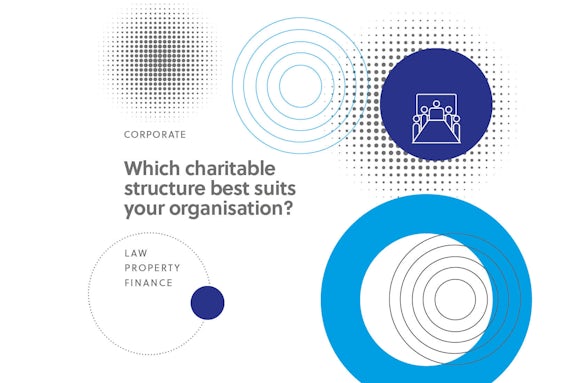Would your charitable organisation benefit from being set up as a Community Interest Company v Charity?
Startup charitable organisations face many challenges. Not least is the difficult decision as to which legal structure is used to operate the venture. A charitable organisation can take many legal forms in the UK. This blog post focuses on the difference between the two main vehicles used to operate in the not-for-profit sector; Community Interest Company (CIC) or Scottish Charitable Incorporate Organisation (SCIO).
What is a Community Interest Company?
Structure and Requirements
Asset Lock
A CIC is a type of limited company designed for social enterprises that want to use their profits and assets generated from trade for the public good. CIC’s operate similarly to the limited company in that they generate trade with a view to profiting. The difference between a CIC and a limited company is that CIC’s must reinvest at least 50% of their profits into the community that they represent. This is known as the asset lock. The function of the asset lock is to ensure that assets must be used for the community they serve.
Community Interest Test
Limited companies are set up to benefit the owners, members and employees. The primary purpose of the CIC is to benefit the community. An entity seeking to become a CIC must satisfy the CIC Regulator that a reasonable person might consider that its activities (or proposed activities) are carried on for the benefit of the community.
In the course of making any decision to pursue a CIC for carrying out your activities, you should consider:
- the purposes for the venture;
- the activities of which it will engage; and
- who will benefit from the activities.
Additional Requirements
In addition, CIC’s have to send a copy of their annual accounts to Companies House with an additional Community Interest Report that details their activities for the community and how they are meeting the needs of said community.
Access to finance
The reporting obligations that come with being a CIC can be beneficial for raising finance. Some donors will donate to CICs because of the protection that comes having the same reporting obligations as a limited company.
Limited Liability
CIC’s benefit the owners by the principle of limited liability. This means that those who run and own the business have additional security. This provides the assets of the social enterprise with protection which would not generally be available in other not-profit legal entities.
Governance
A Community Interest Company structure may also be more appealing for the reason that there is a lower level of continual governance for a CIC than a charity. CICs are regulated by the CIC Regulator. CIC regulation protocols are a light touch with the main requirement being the submission of an annual Community Interest Report. Charities, by contrast, are more strictly regulated by the Office of the Scottish Charity Regulator (OSCR) (in Scotland).
What is a SCIO?
The SCIO is different to the CIC as it is not a company nor is it subject to company law rules. However, the SCIO does benefit from the limited liability principle as the SCIO has a separate legal personality to its trustees.
What are the requirements of incorporating a SCIO?
SCIO Requirements
A SCIO can only be a charity the Office of the Scottish Charity Regulator (OSCR) is the regulator of the SCIO’s legal form and in order to become a SCIO, the body must past the charity test. The charity test is in two main parts:
- an organisation has to show that it has only charitable purposes; and
- that it provides public benefit in achieving those purposes.
This is a key point in that
In addition, an organisation cannot become a SCIO if it fits any of the following descriptions:
- it is set up to be or advance a political party;
- its governing document allows it to use its assets (cash or property) for non-charitable purposes; and
- its governing document allows Scottish Ministers to direct or control its activities.
Clearly this limits the ability of certain organisations to use the SCIO as a vehicle for carrying on activities. In addition, a SCIO must have a constitution covering the basic elements of governance. As well as complying with the basic criteria in relation to name, constitution and principal office. The key difference between
Regulation
SCIOs are subject to stringest oversight by the Office of the Scottish Charity Regulator (OSCR). In terms of administrative requirements, SCIO’s must:
- File annual accounts
- Maintain a register of their charity trustees which must be updated within 28 days of any change in SCIO membership. Any person may request a copy of the SCIO’s register of charity trustees and are entitled to be given a copy by the SCIO within 28 days.
- Maintain a register of members that can be requested and must be produced by the SCIO within 28 days of request.
What happens if the SCIO no longer meets the charity test?
Like other charitable organisations, a SCIO must continue to meet the charity test as outlined in point 1. In the event a SCIO fails to meet the test, the OSCR will direct the SCIO to take such steps as the OSCR considers necessary to meet the test. A SCIO which fails to take the steps to meet the test will receive further direction from the OSCR to make an application for solvent or insolvent dissolution. If the OSCR fails to comply with the direction to dissolve, the OSCR must apply to the Court of Session for an order for dissolution.
Conclusion
This guide has focused on the structural requirements of the two most prominent charitable organisation structures currently used in Scotland. Should your organisation require any advice regarding which structure to pursue, please do not hesitate to contact the Corporate team at Gilson Gray.
This concludes the comparative section of this blog series. Next up will be a summary blog encapsulating the key points to takeaway from the series.
If you require further information please contact:
Joanna Millar by email: jmillar@gilsongray.co.uk or by phone: 0141 370 8116/ 07747 653 417.
Oliver Craig by email: ocraig@gilsongray.co.uk or by phone: 0141 286 2017 / 0131 516 5354







